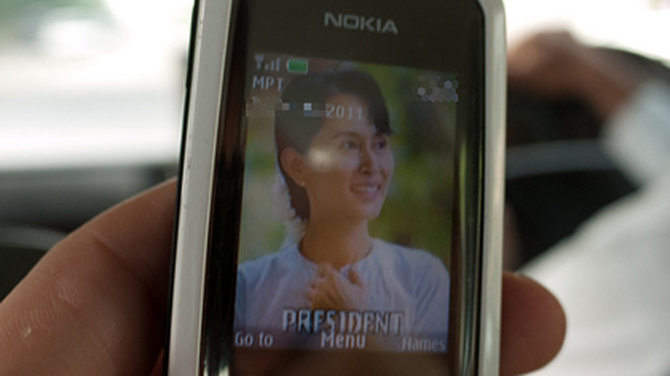A public war of words has broken out in Burma between a private company and government officials over the company’s plans to sell a phone card at a price as low as 5,000 kyat (US $ 6)—100 times cheaper than those currently on the market.
The conflict started in early January when Shwe Pyi Tagon Co Ltd (SPT), a telephone company in Rangoon, announced that beginning in March it would sell 1 million 3G SIM Cards for only kyat 5,000, pending government approval.
Currently, inside Burma it costs an average of $500 to buy a reliable SIM card. So when news of SPT’s intentions was reported in local journals, it was enthusiastically welcomed by many Burmese people, who have been paying much higher prices for phone cards than people in neighboring Thailand.
This week, however, the Burmese Ministry of Communications, Posts and Telegraphs (MPT), which has long monopolized the telecommunication sector in Burma, ran statements in state-run newspapers roundly rejecting the private company's scheme to sell cheap phone cards.
The MPT statement said that it was “absolutely impossible at this time because it takes a considerable amount of time to establish a thorough communications network and the proposal is not in accordance with the existing laws.”
Despite this, SPT issued a statement on Tuesday assuring the public that it has the necessary technology to implement its plan and thus would continue to proceed with efforts to sell a cheap phone card to any Burmese citizens who show their national identity card.
The statement quoted reformist President Thein Sein, who said in a speech last April that government departments must strive to reduce basic expenses for businesses in areas such as telephone lines, electricity and office buildings, as well as transaction costs, because it was eventually public consumers who had to bear the burden of such costs.
SPT also said that the company has informed the MPT of its desire to work as a second mobile network operator in the country, fully relying on its own technology, but to cooperate with the government department regarding its business model.
“We try to provide the cheapest telephone service so that everyone can use a mobile phone,” said Lwin Naing Oo, the managing director of the company in a Tuesday press conference in Rangoon, where the SPT statement was issued.
MPT’s vague citation of “existing laws” may have been an allusion to “security concerns,” which was a predominant factor in decisions by the previous military regime to reject private enterprise proposals, but which has now become a hurdle for entrepreneurs looking to take advantage of government economic reforms.
Cheap phone cards sold by SPT would deal a heavy blow not only to the MPT’s business interests, but also to other mobile phone operators controlled by cronies close to ex-army generals currently serving in Burma’s quasi-civilian government.
MPT and Htoo Trading Co Ltd, a conglomerate owned by US-sanctioned Burmese tycoon Tay Za, are currently selling prepaid phone cards that cost $20-50 dollars.
Early last year, Central Marketing and Elite, both subsidiaries of Htoo Trading Company, entered into a joint venture with the MPT to sell handsets and one-use phone cards.
As a result, allegations have surfaced that MPT officials are resisting SPT’s cheap SIM card proposal because of business dealings they may have with Tay Za’s companies.
Burma’s current Constitution states that the national government shall prevent acts that harm the public interest through monopolization or manipulation of prices by an individual or group with intent to endanger fair competition in economic activities, and an anti-trust bill was proposed in Parliament last year by an opposition party.
Whether or not SPT’s plan to sell cheap phone cards is allowed to proceed will provide an indication of whether the new government can create a fair economic playing field that encourages new domestic businesses and foreign investment.

